
The New Zealand national rugby union team, commonly known as the All Blacks, represents New Zealand in men's international rugby union, which is considered the country's national sport. Famed for their international success, the All Blacks have often been regarded as one of the most successful sports teams in history.

David Gallaher was an Irish-born New Zealand rugby union footballer best remembered as the captain of the "Original All Blacks"—the 1905–06 New Zealand national team, the first representative New Zealand side to tour the British Isles. Under Gallaher's leadership the Originals won 34 out of 35 matches over the course of tour, including legs in France and North America; the New Zealanders scored 976 points and conceded only 59. Before returning home he co-wrote the classic rugby text The Complete Rugby Footballer with his vice-captain Billy Stead. Gallaher retired as a player after the 1905–06 tour and took up coaching and selecting; he was a selector for both Auckland and New Zealand for most of the following decade.

Billy Stead, born John William Stead, was a rugby union player born in Invercargill who played for New Zealand, the All Blacks, on their 1905–06 tour. Stead also played provincially for Southland, and later coached various teams, including Southland and the New Zealand Māori. A bootmaker by trade, he also co-authored The Complete Rugby Footballer with Dave Gallaher, and was a columnist for the Southland Times, and New Zealand Truth.

The 1888–89 New Zealand Native football team was a New Zealand rugby union team that toured Britain, Ireland, Australia and New Zealand in 1888 and 1889. It mostly comprised players of Māori ancestry, but also included some Pākehā. A wholly private endeavour, the tour was not under the auspices of any official rugby authority; it was organised by New Zealand international player Joseph Warbrick, promoted by public servant Thomas Eyton, and managed by James Scott, a publican. The Natives were the first New Zealand team to perform a haka, and also the first to wear all black. They played 107 rugby matches during the tour, as well as a small number of Victorian Rules football matches in Australia. Having made a significant impact on the development of New Zealand rugby, the Natives were inducted into the World Rugby Hall of Fame in 2008.
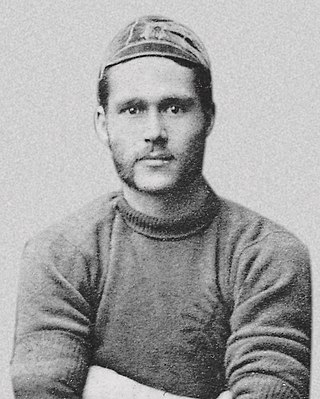
Joseph Astbury Warbrick was a Māori rugby union player who represented New Zealand on their 1884 tour to Australia and later captained the 1888–89 New Zealand Native football team that embarked on a 107-match tour of New Zealand, Australia, and the British Isles.

Thomas Rangiwahia Ellison, also known as Tamati Erihana, was a New Zealand rugby union player and lawyer. He led the first New Zealand representative rugby team organised by the New Zealand Rugby Football Union (NZRFU) on their 1893 tour of Australia. Ellison also played in the 1888–89 New Zealand Native football team on their epic 107-match tour, scoring 113 points, and 43 tries with the side.
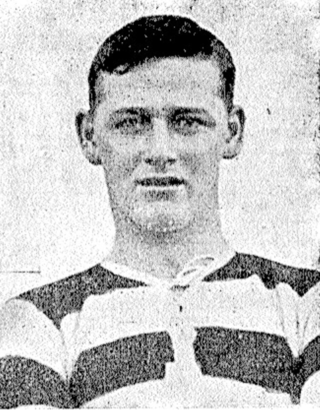
John Richard "Dick" Wynyard was a New Zealand rugby footballer who was part of the professional 1907-1908 New Zealand rugby tour of Great Britain. Richard was the brother of William Wynyard. He had 2 sisters, Kathleen Amelia Wynyard (1887-1965), and Audrey Gertrude Wynyard (1892-1920), and 2 brothers, Leslie Henry (Hec) Wynyard (1889-1985), and Sydney Montague Wynyard (1894-1953)

William Thomas Wynyard was a New Zealand rugby football player who was part of the professional rugby league 1907–08 New Zealand rugby tour of Australia and Great Britain.

Alfred Patchett Warbrick was a New Zealand boatbuilder, rugby player and tourist guide.
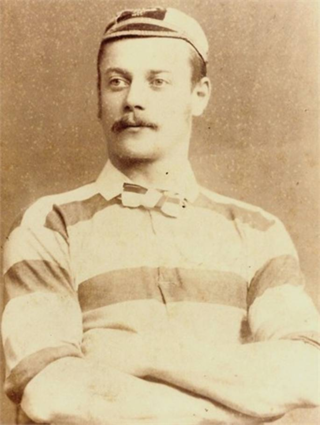
Henry "Harry" Collinge Speakman was an English rugby union utility back who played club rugby for Runcorn. Although never capped at international level in his own country, in 1888 Speakman was chosen to tour New Zealand and Australia as part of the first British Isles team. Speakman later settled in Australia and played rugby for the several local teams as well as being selected to play for Queensland.

Patrick Keogh, also known as Pat Keogh or Paddy Keogh, was a New Zealand rugby union footballer who toured with the 1888–89 New Zealand Native football team. Playing at half-back, Keogh was considered the star player on the tour, which was the first by a Southern Hemisphere team to the British Isles. He played in at least 70 of the team's 107 matches in the British Isles, Australia and New Zealand. After playing for Dunedin club Kaikorai from 1884, he was selected to represent his province of Otago from 1887, and played for them against the touring British Isles team in 1888. By this time Keogh had established himself as the outstanding half-back in New Zealand, and he was approached by Joe Warbrick to tour with the Native team in mid-1888.
Edward Elsmere Montgomery McCausland, was an Australian born sportsperson who as a rugby footballer toured with the 1888–89 New Zealand Native football team. The touring party played predominantly rugby union, but also a small number of association football and Victorian rules football matches. McCausland was also a cricketer of note and is recorded to have represented Wellington in a First-class match.
Arthur Warbrick, was a New Zealand sportsperson who as a rugby footballer toured with the 1888–89 New Zealand Native football team. The touring party played a variety of football games, including rugby union, association football and Victorian rules football. Warbrick was one of six brothers, four of whom followed Warbrick on the 1888 tour to Britain, Ireland and Australia.

David Richmond Gage was a New Zealand rugby union footballer. He played with the 1888–89 New Zealand Native football team, and represented New Zealand in 1893, and once in 1896 when he captained the side.
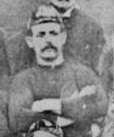
George Albert Williams, also known as Bully Williams, was a New Zealand rugby union player who toured with the 1888–89 New Zealand Native football team to the British Isles and Australia. Williams was one of five non-Māori players in the Natives' side.

Riki Te Mairiki "Dick" Taiaroa was a New Zealand rugby union footballer who was a member of the 1888–89 New Zealand Native football team that toured New Zealand, the British Isles, and Australia. The tour was the longest in rugby history—the team played 107 matches on tour—and Taiaroa played at least 59 matches in the British Isles and 85 in total. This was second in number only to William Elliot who played 86 matches total. Taiaroa also played provincial rugby for Wellington in 1886 and 1887, and Hawke's Bay in 1889. Outside of rugby, he was a surveyor and then farmer. He also served with the New Zealand Contingent of Mounted Rifles during the Anglo-Boer War. Taiaroa was from a prominent Māori family, and was a representative at the coronation of Edward VII and George V. In the 1949 King's Birthday Honours he was appointed an Officer of the Order of the British Empire for services to the Māori people.
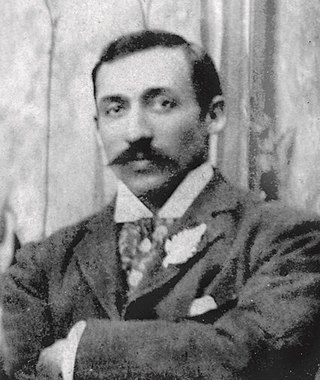
William Thomas "Tabby" Wynyard was a rugby union footballer who toured with the 1888–89 New Zealand Native football team and the 1893 New Zealand team. He also played first-class cricket for both Wellington and Auckland.
Frederick Warbrick was a rugby union footballer who toured with the 1888–89 New Zealand Native football team on their tour of the British Isles, New Zealand, and Australia. The Natives tour was captained and organised by Fred Warbrick's brother Joe, who had played with the New Zealand team on their 1884 tour of New South Wales. Joe Warbrick eventually selected 26 players for the team, which consisted mostly of Māori or part-Māori, but also several European "Pakeha". Along with Joe and Fred there were three other Warbrick brothers in the side: Alfred, Arthur, and Billy.

William "Mother" Elliot , also known as Bill, was a New Zealand rugby union footballer who toured with the 1888–89 New Zealand Native football team. Elliot was one of five Pākehā (European) players in the predominantly Māori team, and his addition strengthened the side. Playing at half-back, he became one of the most prolific players on the tour, and appeared in at least 86 of their 107 matches in the British Isles, Australia and New Zealand. While on tour he played in all three of the internationals against England, Ireland, and Wales. When he returned from the tour he continued to play provincial rugby for Auckland, whom he represented from 1887 to 1896. Before he departed with the Natives he had twice represented Auckland against the touring British side, and had scored a try against them in the second match, a 4–0 victory for Auckland. He was initially selected for New Zealand for their 1893 tour of Australia, but was unable to secure leave from work.
















